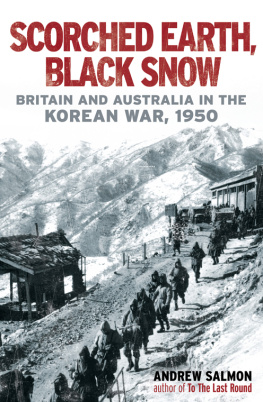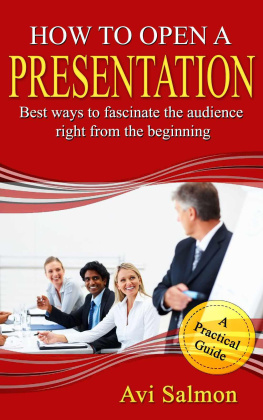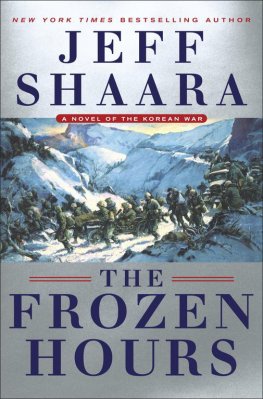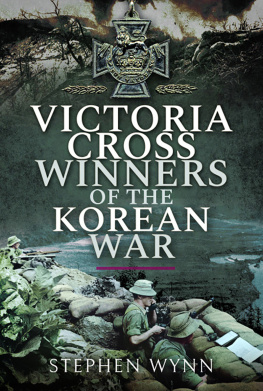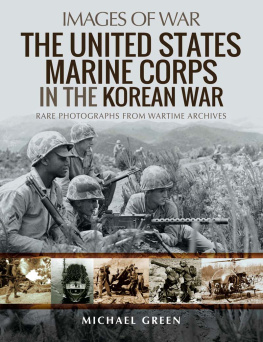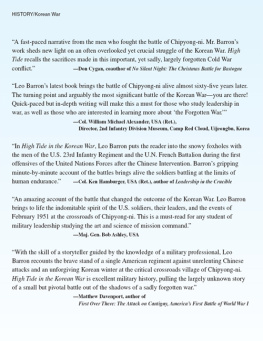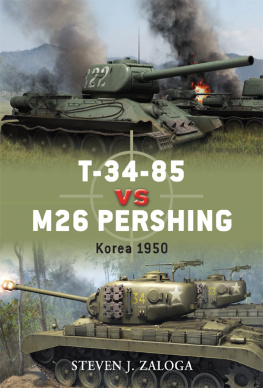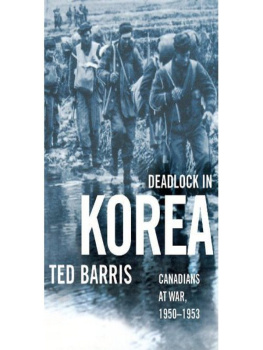In a list of very strong military books, this is an excellent book, which well-deserves the winning award Professor Richard Holmes, awarding To the Last Round the Hampshire Libraries inaugural Best Military Book of the Year prize for 2009
Gripping exhaustively researched and expertly written
Saul David, The Times
An enthralling, action-packed book [that] relives every moment of this astonishing battle David Hardman, Daily Mail
War porn at its finest, all the more delicious for being totally true
James Delingpole, The Spectator
One of the most interesting books about Korea, 2010
Wall Street Journal
Salmons vivid use of recollections and dramatic quotes brings alive an unjustly forgotten conflict
Tim Newark, Time Out
Over a thousand British servicemen lost their lives in the Korean War and here, at last, is a compelling account of a defining moment in the conflict
Good Book Guide
Filled with detail enough to win the attention even of those for whom military histories may seem irrelevant when stacked against social and political analysis
Don Kirk, Far Eastern Economic Review
A superb book which showcases British courage during a now almost forgotten last stand
Soldier magazine
Marshal Peng Te-huai, Korea, 1950
At the frontier
They say the soil now
Is more bones than earth
Wei Chuang, Tang Dynasty, ninth century
And its War! Orderly, hold the light.
You can lay him down on the table; so.
Easily gently! Thanks you may go.
And its War! But the part that is not for show
Edgar Wallace
Contents
Introduction
Distant Holocaust,
Forgotten Men
God of our fathers, known of old,
Lord of our far-flung battle-line,
Beneath whose awful hand we hold,
Dominion over palm and pine,
Lord God of Hosts, be with us yet,
Lest we forget lest we forget!
Rudyard Kipling
Since the turn of the millennium, the British public has been forced to relearn a painful lesson: Soldiers die in war.
While this might seem self-evident, the events of the 1980s and 90s bar that oddly old-fashioned conflagration, the Falklands War seemed to prove it invalid. In peace-keeping operations in Africa and the Balkans, counterinsurgency in Northern Ireland and the one-sided adventure of Desert Storm, Britons suffered a reassuringly gentle trickle of casualties. The armed forces, it seemed, were so well trained and equipped that they could operate, either independently in low-level conflicts, or in alliance with their mighty American allies in larger ones, at minimal risk.
That shibboleth now lies shattered. In interventions in Iraq and Afghanistan, the army met a foe who, though lightly armed, fought skilfully, using guerilla tactics fired by religious zeal. Not only did he not collapse, he inflicted losses that soon exceeded a trickle, though have not (yet) reached a flood.
These conflicts are the best-covered wars the UK has ever fought, blazing across TV reports, video-sharing websites and the print of innumerable articles and books. Perhaps it is this firestorm of coverage that has led some commentators to suggest that the intensity of combat, the losses incurred and the perils faced, are unprecedented in the British Armys post-1945 experience.
Nonsense. A conflict that received scant attention at the time, and which is today almost unknown in the UK, remains far and away the biggest, bloodiest, most brutal war fought by British troops since the Second World War: Korea.
The biggest: A war of advances and retreats of hundreds of miles, fought against the army of the worlds most populous nation. The bloodiest: 1,087 British servicemen fell in Korea in barely three years of fighting, a number greater than the total killed in the Falklands (255), Iraq (179) and Afghanistan (349) combined 783. And the most brutal: A sampling of incidents in this book should make that clear.
The militarys ability to fight operations of scale and intensity rests upon national will, but twenty-first century Britain is casualty sensitive and cost-conscious. The slipped discs in todays national spine epitomised in 2007s humiliating retreat from Basra contrast with the solid backbone Britain exhibited in 1950. Then, the UK was bankrupt from the Second World War, abandoning empire and suffering military overstretch. But London had obligations: As a charter member of the UN, as an ally of the United States and as the defender of a state facing aggression. Even when China surged into the war, even when casualties soared, even though it meant lengthening National Service and raising the defence budget Britain stayed the course. This was honourable conduct.
In 1950, an under-equipped, under-gunned British brigade was deployed into a high-risk conflict in a distant, primitive theatre against an unknown, alien enemy at ludicrously short notice. As in Afghanistan, they were fighting alongside US troops, though in the early months of the Korean War, the American Army was at a nadir. The scratch 27th Brigade a good, but hardly elite formation proved so effective, that despite lacking transport, armour and artillery, it was tasked with key missions. Meanwhile, the crack 41 Commando a unit that did not even exist at the outbreak of hostilities was embedded with Americas finest troops, the 1st US Marine Division. In the most harrowing campaign of the war, the commandos won a US Presidential Unit Citation and plaudits from their comrades that still echo six decades later.
* * *
This book is not a full history of the war Sir Max Hastings The Korean War is recommended for casual readers, Dr Allen Millets The War in Korea trilogy is the best for the specialist. Nor does it detail the featured units full participation in Korea: All continued operations well into 1951. What it is, is a narrative history of those formations during the wars most dramatic period: summer to the end of the Year of the Tiger, 1950.
Those months cover the defence of South Korea and the charge into North Korea; the shock Chinese intervention and the catastrophic defeat of UN forces; the hellish retreat and the tragedy of a nation put to the sword. Even the weather mirrored the drama, as the seasons transitioned from summer to autumn to winter. This period has been covered by American historians, but this book features a group of actors whose experiences have gone largely unrecorded: the Australians and Britons who made up the UN Commands first non-Korean, non-American ground troops.
Episodes include the worst friendly fire disaster suffered by the British Army since the Second World War; a barely believable mistaken identity action fought at handshake range; a desperate breakout to escape entrapment; and a harrowing fighting retreat amid Siberian temperatures. The units covered are large enough to encompass a broad range of experience, but small enough for individual characters to stand out. How, then, to tell their tale?
There are, essentially, three approaches to writing military history. The first is military science: the generals art, the strategic picture, the broad sweep of arrow on map. The second is technical: The weapons of the combatants, their capabilities and drawbacks. The third is the human story: What actually happens to men in war? What do they see, do, think, feel?
For context, I have sketched in the broad background as it unfolded in the politicians chamber and across the generals maps, and included information on weapons and equipment, but my preferred approach is the third. War is like all history a jigsaw of biographies. While I have referenced books, articles, letters, unit diaries and personal notebooks, the meat of this story is oral, allowing the reader, I hope, to meet these men, to witness the war through their eyes.

